Although adorable to some people, mice can wreak havoc on your property and leave you exposed to several health risks. This explains why most homeowners strive to come up with immediate solutions like using pesticides and several home remedies. A commonly mentioned mice control method is using bleach, but will this toxic chemical repel mice?
Does bleach repel mice? Bleach repels mice due to its unbearable pungent smell. It’ll make mice steer clear of any bleach-sprayed property or area. Besides repelling them, it can also kill mice if consumed in large amounts. If sprayed on mice droppings, it can also kill off the harmful bacteria that cause hantavirus.
Curious to learn more about mice control and whether bleach is your go-to solution? Then read on as we discuss everything you need to know about using bleach as a mice repellant.
How To Repel Mice?
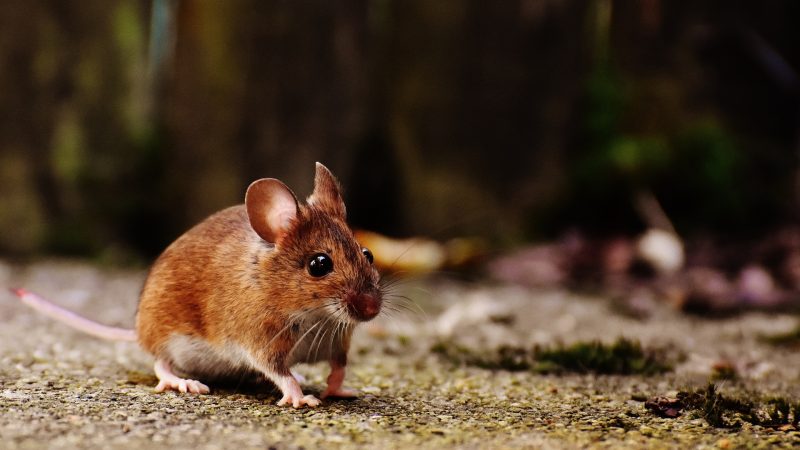
Similar to most pests, there are several ways to repel mice and get rid of these unwelcome guests.
To repel mice, you can use strong scents, such as animal scents like cats. Other strong scents you can use include lightly diluted bleach and essential oils like peppermint oil and lavender.
Commercial repellents like Grandpa Gus’s Mouse Repellant can also help.
- Natural Mouse Repellent: Keep mice out of your home, garage, car,...
- All-Natural Formula: Made with plant-based essential oils, this...
- Air Freshener: Not just a repellent, each pouch doubles as an air...
- Extra-Strength Protection: Each pouch covers 50 sq. ft.,...
- Easy to use: Remove the pouch from its resealable bag and place...
However, the best way to keep mice at bay is by maintaining a high level of hygiene and observing good waste disposal practices. Additionally, keeping your yard clutter-free will also help keep these annoying critters away.
Bleach and Mice
Mice rely on their strong sense of smell to escape predators and collect food. In this section, we’ll discuss whether bleach’s strong smell is enough to keep mice away and even kill them.
Do Mice Like Bleach?
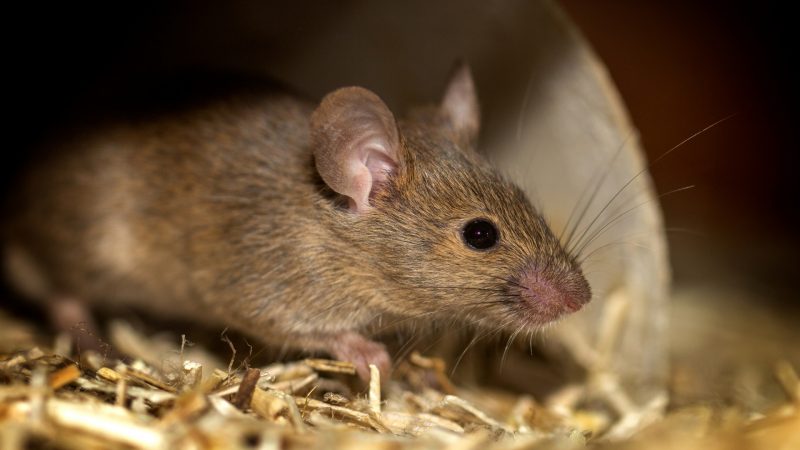
Mice don’t like bleach. A study on how odors affect rodent behavior concluded that pests like rats don’t fancy strong smells. And since bleach is a chemical with a rather unwelcoming smell, rats will do all they can to avoid being close to bleach-sprayed areas.
Do Mice Hate Bleach?
Mice hate bleach because not only does it have a strong scent, but it’s also potentially fatal to them when consumed. This is because they have well-developed senses of smell, meaning they’re more likely to be bothered by strong scents, unlike most other pests.
So, as purely instinctive animals, mice won’t fancy hanging around bleach-treated homes.
Does Bleach Keep Mice Away?
Bleach keeps mice away, which makes it an effective mice repellent. However, for the remedy to work, it’s highly advisable to spray the solution carefully. Target areas where they’re likely to hide. But to keep them completely outside your property, it’s best to spray your entire home.
The stronger the scent of the bleach, the likelier mice will be kept at bay.
Can Mice Die From Ingesting Bleach?
Mice can die from ingesting bleach because it contains potentially harmful compounds like sodium hypochlorite, calcium hypochlorite, and sodium hydroxide, which can lead to hyperchloremia, hypernatremia, and a host of other biochemical anomalies.
However, due to their brilliant sense of smell, mice won’t be attracted to traps laced with strong-smelling chemicals like bleach. This means that although they might consume foods with bleach, they might not eat the right amounts to die. Sometimes the response to consuming bleach takes less time to manifest, especially when small quantities are consumed.
What Does Bleach Do to Mice?
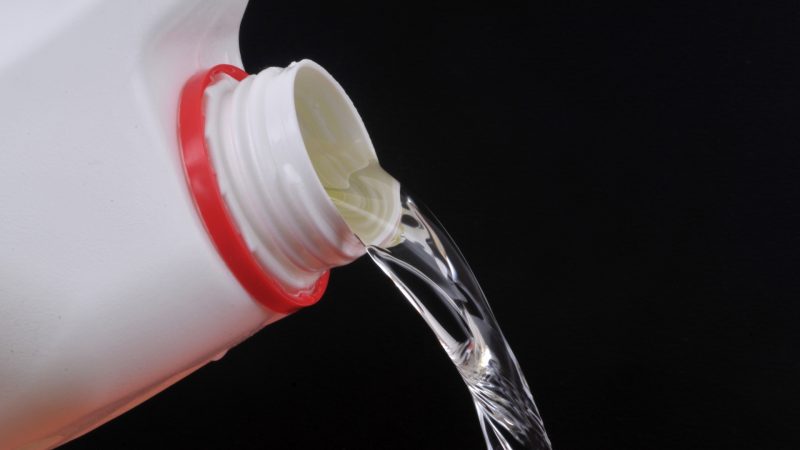
Bleach repels mice due to its pungent smell that’s often unbearable to the other critters. In addition to the smell, it can also cause damage to the internal tissues of mice, leading to issues like bleeding and reduced oxygen intake, which can lead to death.
If consumed in small amounts, the mice are likely to survive and recover after a couple of days (depending on the extent of the injury). However, the bleach might cause damage to the throat and airways.
Once bleach makes its way inside the rodent’s stomach, it’ll gradually weaken the epithelial cells, breaking them down as the bleach continues to break down other cells, fats, and inner tissues.
In case mice ingest large amounts of bleach, then they’re highly likely to experience breathing difficulties and unbearable abdominal pain. Additionally, it can lead to conditions like pulmonary edema, a potentially fatal condition where the body’s ability to absorb oxygen is severely impaired due to a buildup of fluid in the lungs.
How To Use Bleach Spray To Keep Mice Away?
To use bleach to keep mice away, there are several ways to do this, as discussed below.
Spray Bleach on Areas With High Mice Activity
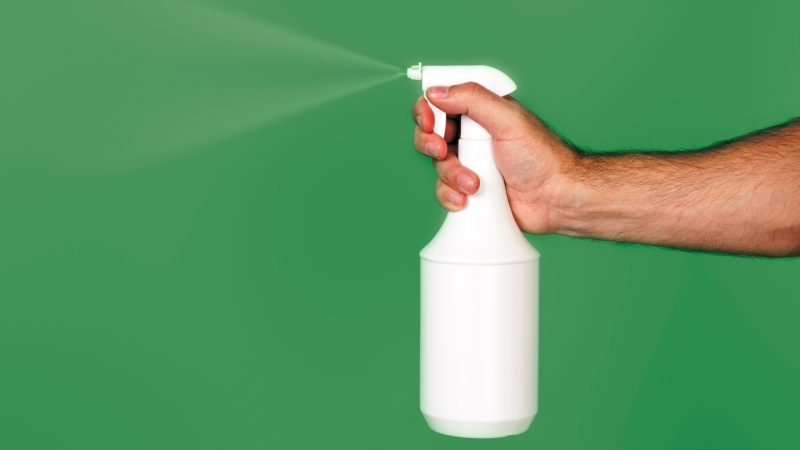
Spraying bleach directly on the mice-infested areas is a great way to repel the pests. However, due to chlorines choking smell, it’s best to dilute it with water to reduce the unpleasant smell of the solution.
When spraying bleach, target areas like pathways and corners, ensuring you leave several exits for unwelcome guests to escape.
Spraying potential hiding grounds works well when looking to repel mice as opposed to killing them because, due to their impeccable sense of smell, they’re unlikely to touch anything laced with chlorine. So, the mice will flee from your yard or home if you spray a generous amount of chlorine in the main entry points.
To ensure the smell lasts long enough, you can try soaking bleach in cotton wool and placing them close to the entry points.
Lacing Food With Bleach To Kill Mice
If you’re tired of the persistent mice and rat intrusion in your home, then maybe it’s time to bring in the big guns and try eliminating the pests. But due to bleach’s strong smell, finding a way to mask the pungent odor should be your first step.
One foodstuff that’s likely to get the job done when dealing with mice is peanut butter. To do this:
1. Take a tablespoon of butter and mix it with bleach, ensuring that you stir the mixture until the strong smell of chlorine is no more.
2. After you’re done prepping the bait, place it in a strategic location that’ll attract the mice.
The mice should help themselves to the bait if you did a good job of masking the strong scent of bleach.
Spray Their Entry and Exit Points and Disinfect the Area
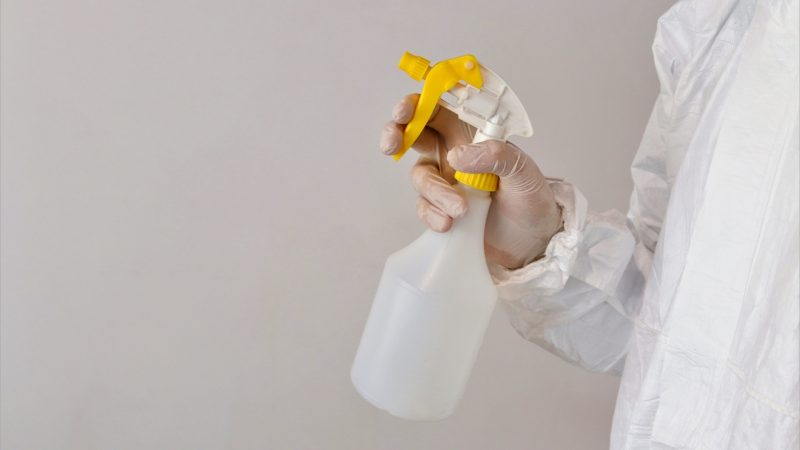
Although potentially risky due to its strength, bleach is a great repellant as it also disinfects infested areas.
Therefore, as you look to get rid of the pests, try to go the extra mile and target the hiding places or potential nesting areas. This means you’ll need to do your homework and identify entry and exit points as well as the nesting areas.
Not only will applying the bleach helps get rid of the pests, but it’ll also leave the affected areas well disinfected, which goes a long way in keeping you and your family safe.
Will the Smell of Bleach Keep Mice Away After Spraying Bleach on Mice Dropping?
Mice and rats are coprophagic rodents, which means they eat their droppings to allow for the absorption of nutrients like folic acid and vitamin B12. This means that, through the scent of their droppings, mice can tell a lot about the immediate environment and also pick up scents from other mice and potential predators.
The smell of bleach will not only keep mice away after spraying bleach on mice droppings, but it’ll also kill off the harmful bacteria, thereby reducing the chances of contracting diseases like Hantavirus.
When spraying bleach on droppings, allow the solution to soak for a few minutes. It’s best to spray the areas after removing the droppings to ensure the bleach smell remains even after cleaning up.
What Bleach To Use To Get Rid of Mice? Products Review
Some of the best bleaching products to use to get rid of mice that are available on Amazon include:
Clorox Concentrated Splash-less Bleach
- SPLASH-LESS CLEAN: Concentrated, splash-less bleach in a thicker...
- DISINFECTING BLEACH: Concentrated bleach liquid kills 99.9% of...
- EASIER TO POUR: The same trusted Clorox clean in a smaller...
- STAIN REMOVER & LAUNDRY SANITIZER: Whitens, brightens, and...
- AMERICAS #1 BLEACH*: Clorox bleach is perfect for everyday...
Clorox Concentrated Bleach is among the best products to use for eliminating odor, whitening, and disinfecting surfaces. As indicated on the bottle’s labeling, the bleach kills 99.9% of disease-causing bacteria and contains 4.5% sodium hypochlorite, which should be enough to kill mice and rats if ingested in good amounts.
Fantastik All-Purpose Bleach Cleaner
- Multi-surface cleaner is perfect for kitchen, bathroom, and...
- Removes tough food stains and greasy soil
- Effective on countertops, stovetops, sinks, appliances, shower...
- No smeary residue
- Leaves behind a fresh, clean scent
Another bleach you can use to keep mice and rats away from your household is the Fantastik All-Purpose Bleach Cleaner. The bleach contains surfactants and sodium hypochlorite, meaning it can kill mice if well-masked with peanut butter. The strong smell will also help repel mice and keep them far away from your yard.
Related: How To Get Rid of Mice?
List of Sources
Potter, M. F. (1994). Control of Mice. University of Kentucky.
RSPCA Knowledge Base. (2020). What is the Most Humane Way to Kill Pest rats and Mice?
Healthy Western Australia. Protect Your Health- Keep Rats and Mice Under Control.
California Childcare Health Program. (2018). Integrated Pest Management: Rats and Mice. University of California.
- How to Get Rid of Copperheads | Practical Guide - August 27, 2023
- How to Get Rid of Corn Snakes | What Makes Them Aggressive? - August 27, 2023
- How to Get Rid of Alligators | Safety Measures and Removal Methods - July 16, 2023



